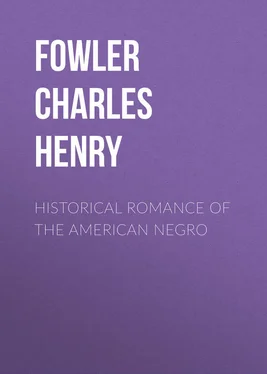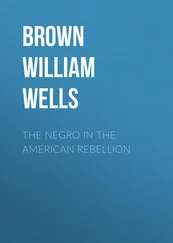Charles Fowler - Historical Romance of the American Negro
Здесь есть возможность читать онлайн «Charles Fowler - Historical Romance of the American Negro» — ознакомительный отрывок электронной книги совершенно бесплатно, а после прочтения отрывка купить полную версию. В некоторых случаях можно слушать аудио, скачать через торрент в формате fb2 и присутствует краткое содержание. Жанр: История, foreign_antique, foreign_prose, на английском языке. Описание произведения, (предисловие) а так же отзывы посетителей доступны на портале библиотеки ЛибКат.
- Название:Historical Romance of the American Negro
- Автор:
- Жанр:
- Год:неизвестен
- ISBN:нет данных
- Рейтинг книги:5 / 5. Голосов: 1
-
Избранное:Добавить в избранное
- Отзывы:
-
Ваша оценка:
- 100
- 1
- 2
- 3
- 4
- 5
Historical Romance of the American Negro: краткое содержание, описание и аннотация
Предлагаем к чтению аннотацию, описание, краткое содержание или предисловие (зависит от того, что написал сам автор книги «Historical Romance of the American Negro»). Если вы не нашли необходимую информацию о книге — напишите в комментариях, мы постараемся отыскать её.
Historical Romance of the American Negro — читать онлайн ознакомительный отрывок
Ниже представлен текст книги, разбитый по страницам. Система сохранения места последней прочитанной страницы, позволяет с удобством читать онлайн бесплатно книгу «Historical Romance of the American Negro», без необходимости каждый раз заново искать на чём Вы остановились. Поставьте закладку, и сможете в любой момент перейти на страницу, на которой закончили чтение.
Интервал:
Закладка:
As my mother, Harriet Jackson, was a woman of great handsomeness, beauty and a thousand graces, and still comparatively young, being only thirty-seven, her hand was sought by a settled and most honorable man named Mr. John B. Sutherland, a resident of Buffalo, and a member of the A. M. E. Church. They had a nice wedding at the church on Vine street, in the presence of an applauding and highly-respectable company. It was a perfect union of hearts, like Jacob and Rachel's over again. As we had plenty of room, and were unwilling to have mother set up a different establishment, Mr. and Mrs. Sutherland took up their residence with us, and all things went on most harmoniously together. The Almighty seemed to pour His richest blessings upon us all, and we tried to honor and glorify His holy name in all that we did. Our experience in slavery had been light, and we were now only too thankful to be free.
One day in the month of November, Tom received the following letter from Mrs. Jackson at Riverside Hall, though it was intended for all three of us:
"RIVERSIDE HALL, Near Louisville, November, 1855."Mr. Thomas Lincoln,
"Dear Tom: – We duly received all your letters, and also the Buffalo newspaper with an account of the marriage of Harriet to Mr. John B. Sutherland. That would all be right enough if you were white people, or even free people of color, but the whole three of you are neither one nor the other. You are our goods and chattels, and our runaway slaves, and we have decided to bring you back, or else you must pay us the reduced sum of one thousand dollars apiece; that is, two thousand dollars, when we will give you your free papers, and a full discharge. As your master and mistress, we are herein doing you a great favor, for we could easily get two thousand dollars apiece for each of you, Tom and Beulah, in the public market. I suppose you are aware that the Fugitive Slave Bill is the law of the land, and in case you do not give us satisfaction immediately, we will proceed to put the law in force, and either bring you back to Riverside Hall, or sell you down the river. Now, Tom, a word to the wise is sufficient. We shall look for a letter from you soon.
"I am yours respectfully,
"SARAH JACKSON."When the above letter arrived at our house, the whole four of us were seated at the tea table in the evening, and laughing first over one thing and then another, as people will do at eventide when the work of the day is done. We read the letter aloud in the midst of great sport and laughter, which went on, grew and increased the more we examined it. It was the work of Mrs. Jackson and hers alone. None of us believed that father knew anything about it at all, and I am sure he did not. Mrs. Sarah Jackson evidently was unable to keep down her temper and spite after all our grand escapades, marriages and other things.
"Why," said Mr. Sutherland, "I suppose she will be coming on us with bloodhounds themselves! She would look grand in hunting costume on the streets of Buffalo with bloodhounds!"
"What makes me laugh," remarked Tom, "would be to see the boys and young lads pelting those dogs with stones, and belaboring their sides with big sticks!"
This was followed by another shout of loud laughter, when mother exclaimed,
"She would indeed be a sight well worthy of a first-class painter in the midst of an infuriated crowd who were bent upon our protection and rescue."
As it was now my turn to put in a word, I remarked,
"She had better send nobody after us. It is now five years since the passage of the Fugitive Slave Bill, which no man can enforce, because the Christian spirit of the North will not have it, and the North is right to resist it."
The question next arose as to who should answer the letter. Tom and Mrs. Sutherland absolutely refused to answer it in any shape or form, so I took pity on the great lady of Riverside Hall, and said that I would answer her one of these fine days, which would be both sport and pleasure for me, and then perhaps she would let us all have a rest. So in a few days after the receipt of her wonderful letter, I took up my pen and wrote as follows:
"BUFFALO, N. Y., November, 1855."Mrs. Sarah Jackson,
"Madam: – As both Tom and Mrs. Sutherland have absolutely refused to take the slightest notice of your letter, it has fallen to me to answer it. It would not suit the convenience of any of us to come to Riverside Hall at this time, or, indeed, to go anywhere else. Even if we had all the opportunities in the world, we would not come to Riverside unless we came as specially invited guests; a visit, in short, that would be a mutual gratification to us all. But at this time, Tom has got a most excellent situation on Delaware avenue, the grand residence avenue of Buffalo; besides, he has married a wife, and therefore he cannot come. (Such is the language of Holy Writ).
"As for myself, the grand committee on abolition have engaged me to give a number of lectures, and to sing at their meetings in the interest of the freedom of all those who are held in the South in enforced and involuntary bondage. The committee on freedom think that the presence of a young woman like me would help on the good cause, draw the crowds, and drive another nail into the coffin of slavery in Kentucky, and wherever the hated institution exists.
"It will not be a very hard thing for me to make out a clear case against slavery, and in favor of freedom. Now, just look at myself, and all those graces and qualifications that I possess and inherit from both father and mother, and how our gracious Lord has cut me out to be something, and to do something in the world! Suppose that I had chosen to remain at Riverside Hall! What was to hinder you spiriting me away to the cotton fields of the Sunny South to wear my life away as if I were a mere animal, instead of being a human being like yourself, and one for whom Christ died? I therefore rejoice at dear mother's freedom; for slavery is nothing but a revolting crime – a system of robbery and murder! Now, here I am, and in a short time intend to appear on the public stage in the capacity of a lecturer, a singer and a player on the piano. Just fancy the idea of a handsome young woman of seventeen, like myself, being sold away to Louisiana or Georgia to wear my life away among the rice fields, the cotton and the cane, when nature has qualified me with gifts and graces, the admiration of my gallant and clever Tom, and the 'pick' of the general public to serve against slavery in the Northern States! I only hope that I shall be able to do my full share to help on the great conflagration that is now raging all over the free states, and which I hope will never cease burning until it has burnt the whole 'institution' down to the ground. Here in the North I shall be seen and heard by legions of people. But who would ever see or hear me in the cotton fields, or the sugar plantations, and in the rice swamps of Louisiana or Georgia?
"I have failed to answer your letter in the way intended. What impression you intended to make on my mind is more than I know. Your statements were nothing but the old parrot cries of the South, that have been heard for many years. Of course, you cannot compel us to come back so long as we ourselves object. If you write us any more, and expect your letters to be read, you will have to make them of a readable character. We will tolerate no less respect than if you were writing to the Bishop or his wife. I know you don't wish your letters to be returned to you unread. 'A word to the wise is sufficient.'
"I am yours very respectfully,
"BEULAH JACKSON."The country continued to ring with abolitionism. Orators and agitators continued to traverse it in all directions. Men and women mounted the rostrum, and held forth hour after hour before greatly-interested gatherings of both sexes and all ages. Fugitive slaves who had made their escape over the lines were introduced upon the platform, and gave their wonderful experiences of slavery in the South, and how they managed to get away. It was thrilling to hear some of them tell of all the dangers they encountered upon the road; how they were pursued for hundreds of miles by men, horses and even bloodhounds; how they were assisted by free people of color, and even by those in bondage and white people; and thus helped along week after week, and month after month, till they felt that they were at last both safe and free. When we consider how the slave States passed one law after another, and all pulled, and hauled, and banded together to protect and perpetuate their hold upon their human property, it was most wonderful how very many slaves effected their escape. The nearer the awful storm came to breaking over our heads, the more numerous grew the successful escapes that were made. The frantic South still kept tying the strings tighter and tighter; but instead of producing the effect she desired, the more daring grew the soul of the intrepid slave, who seemed encouraged by the very God of battles himself to strike for liberty and flee to the North.
Читать дальшеИнтервал:
Закладка:
Похожие книги на «Historical Romance of the American Negro»
Представляем Вашему вниманию похожие книги на «Historical Romance of the American Negro» списком для выбора. Мы отобрали схожую по названию и смыслу литературу в надежде предоставить читателям больше вариантов отыскать новые, интересные, ещё непрочитанные произведения.
Обсуждение, отзывы о книге «Historical Romance of the American Negro» и просто собственные мнения читателей. Оставьте ваши комментарии, напишите, что Вы думаете о произведении, его смысле или главных героях. Укажите что конкретно понравилось, а что нет, и почему Вы так считаете.












